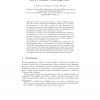Free Online Productivity Tools
i2Speak
i2Symbol
i2OCR
iTex2Img
iWeb2Print
iWeb2Shot
i2Type
iPdf2Split
iPdf2Merge
i2Bopomofo
i2Arabic
i2Style
i2Image
i2PDF
iLatex2Rtf
Sci2ools
126
click to vote
MICAI
2005
Springer
2005
Springer
Proximity Searching in High Dimensional Spaces with a Proximity Preserving Order
Abstract. Kernel based methods (such as k-nearest neighbors classifiers) for AI tasks translate the classification problem into a proximity search problem, in a space that is usually very high dimensional. Unfortunately, no proximity search algorithm does well in high dimensions. An alternative to overcome this problem is the use of approximate and probabilistic algorithms, which trade time for accuracy. In this paper we present a new probabilistic proximity search algorithm. Its main idea is to order a set of samples based on their distance to each element. It turns out that the closeness between the order produced by an element and that produced by the query is an excellent predictor of the relevance of the element to answer the query. The performance of our method is unparalleled. For example, for a full 128-dimensional dataset, it is enough to review 10% of the database to obtain 90% of the answers, and to review less than 1% to get 80% of the correct answers. The result is more ...
Artificial Intelligence | MICAI 2005 | Proximity Search | Proximity Search Algorithm | Proximity Search Problem |
Related Content
| Added | 28 Jun 2010 |
| Updated | 28 Jun 2010 |
| Type | Conference |
| Year | 2005 |
| Where | MICAI |
| Authors | Edgar Chávez, Karina Figueroa, Gonzalo Navarro |
Comments (0)

